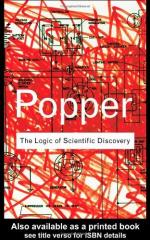
|
| Name: _________________________ | Period: ___________________ |
This test consists of 15 multiple choice questions and 5 short answer questions.
Multiple Choice Questions
1. What depends on both universal and singular statements?
(a) Logical factors.
(b) Causality.
(c) Abstract thought.
(d) Correlations.
2. To what does Popper equate critical thinking?
(a) Rational attitude.
(b) Common sense.
(c) Inductive thinking.
(d) Deductive thinking.
3. What deductive tests determine if a theory is a scientific advance?
(a) Empirical applications.
(b) Investigations.
(c) Comparing theories.
(d) Internal consistency.
4. What is the theory of theories?
(a) Causality.
(b) Existential statements.
(c) System of theories.
(d) The logic of science.
5. What types of statements are scientific theories?
(a) Proven.
(b) Logical.
(c) Singular.
(d) Universal.
6. What happens if there is on falsifiable information?
(a) Conventionalism is proven.
(b) Learning does not occur.
(c) Experiments fail.
(d) Learning occurs.
7. What type of rule do positivists and reductionists adhere to, according to Popper?
(a) Non-logical rules.
(b) Logical rules.
(c) Rules of Psychology.
(d) Dogmatic rules.
8. According to Popper, what can't universals be reduced to?
(a) Dogmatism.
(b) A class of experiences.
(c) Psychologism.
(d) Infinite regress.
9. What type of statement is deduced from universal statements?
(a) Assumed.
(b) Logical.
(c) True.
(d) Singular.
10. What does Popper use to check his investigations?
(a) Mathematics.
(b) Assumptions.
(c) Testability.
(d) Universal statements.
11. What does Popper fear philosophers will think about methodological investigations?
(a) They do not belong to philosophy.
(b) There is no substance in them.
(c) They do not work.
(d) They contradict years of thought.
12. How are theories used to explain the world?
(a) As abstract thought.
(b) As guides.
(c) By questioning everything.
(d) As concrete fact.
13. How does deductive reasoning begin?
(a) Premise of induction.
(b) Premise of logic.
(c) Premise of falsifiability.
(d) Premise of testability.
14. According to conventionalists, what will yields more complete results of science?
(a) Greater mastery.
(b) Experimentation.
(c) Inferences.
(d) Logical constructions of nature.
15. What type of reasoning does Popper believe inductive reasoning is?
(a) Metaphysical.
(b) Rational.
(c) Philosophical.
(d) Scientific.
Short Answer Questions
1. What do the constructions of the laws of nature determine?
2. What is the reproducible effect which refutes a theory?
3. What does Popper say about positivism?
4. What is one characteristic of the relationship between theory and classes of statements that must be present?
5. According to conventionalism, what is required to make determinations of the natural world?
|
This section contains 371 words (approx. 2 pages at 300 words per page) |

|




